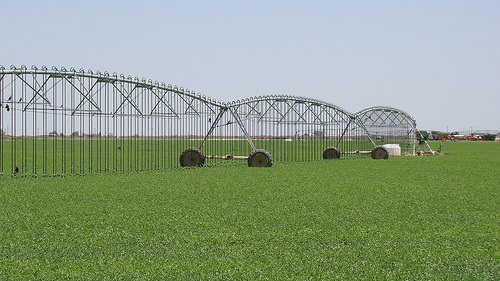
Agricultural News
Managing Salinity in Ground Water Through Crop Selection and Irrigation
Fri, 28 Aug 2015 09:22:31 CDT
 Drought in the Southern Plains has had much more impact than lower yields. Researchers have identified how much higher salinity levels are in soils, due to the pumping of irrigation water from marginal quality wells. Texas A&M University Associate Professor Dana Porter is an Extension Program Leader and Associate Department Head in Lubbock. Porter said salinity in ground water has created a "snowball effect".
Drought in the Southern Plains has had much more impact than lower yields. Researchers have identified how much higher salinity levels are in soils, due to the pumping of irrigation water from marginal quality wells. Texas A&M University Associate Professor Dana Porter is an Extension Program Leader and Associate Department Head in Lubbock. Porter said salinity in ground water has created a "snowball effect".
"If we are in a deficit irrigation situation, we're not able to leach the water," Porter said. "We don't have rainfall leaching the salts below the root zone, so we tend to see an accumulation of salts in the root zone and it becomes more problematic over time as it accumulates and now we need to figure out how to management that."
Salinity natural occurs in ground water. While it's unfeasible to treat water, there are ways to manage salinity in the water and in turn in the soil. Porter said the first step is evaluating soil and water quality. Each crop handles salinity differently and some crops are more salt tolerant than others, like barley and cotton.
Different irrigation systems can also help farmers better manage water salinity. Farmers can utilize their water more efficiently with a subsurface irrigation system. This also ultimate allows less salt to be applied to the soil. With that system, Porter said farmers will need to think about managing the salinity levels in the root zones. Some farmers are putting sub surface drip irrigation under every row, versus every other row. She said this can help push the salts away from the root zone.
Another option is called Low Energy Precision Application, known as LEPA. Instead of applying water through a spray irrigation system, Porter said this allows water to be applied directly on the soil surface, which helps avoid leaf wetting and foliar burn.
There are a lot of different solutions on the market, Porter urges farmers to be skeptical and ask a lot of questions. Some sources she recommends include the Natural Resource Conservation Service (NRCS), local irrigation associations and extension educators.
Radio Oklahoma Network's Leslie Smith interviewed Dana Porter of Texas A&M at the recent Irrigation Conference in Fort Cobb, Oklahoma. Click or tap on the LISTENBAR below to hear the full interview.
WebReadyTM Powered by WireReady® NSI
Top Agricultural News
More Headlines...



















